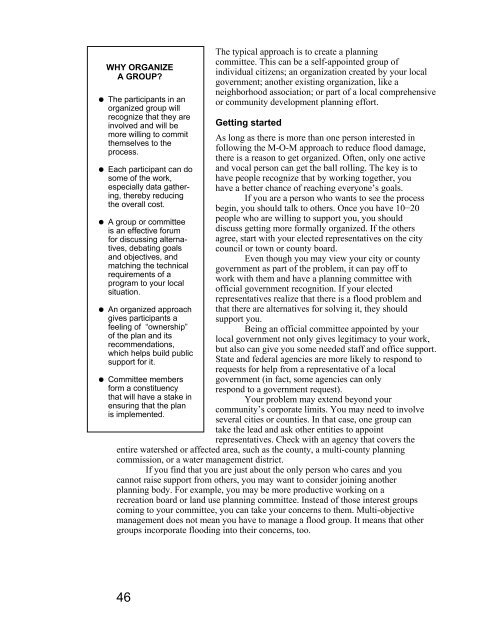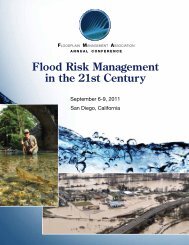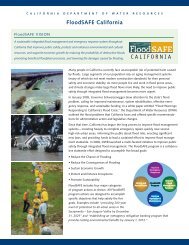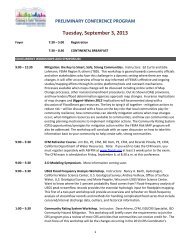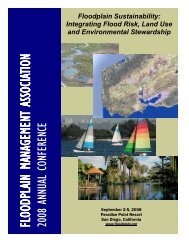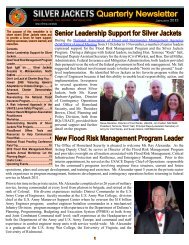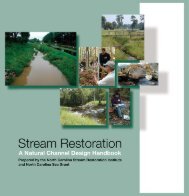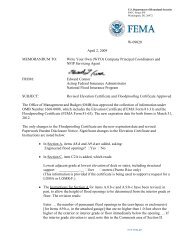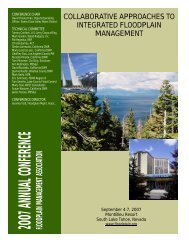Using Multi-Objective Management to Reduce Flood Losses in Your
Using Multi-Objective Management to Reduce Flood Losses in Your
Using Multi-Objective Management to Reduce Flood Losses in Your
Create successful ePaper yourself
Turn your PDF publications into a flip-book with our unique Google optimized e-Paper software.
WHY ORGANIZE<br />
A GROUP<br />
The participants <strong>in</strong> an<br />
organized group will<br />
recognize that they are<br />
<strong>in</strong>volved and will be<br />
more will<strong>in</strong>g <strong>to</strong> commit<br />
themselves <strong>to</strong> the<br />
process.<br />
The typical approach is <strong>to</strong> create a plann<strong>in</strong>g<br />
committee. This can be a self-appo<strong>in</strong>ted group of<br />
<strong>in</strong>dividual citizens; an organization created by your local<br />
government; another exist<strong>in</strong>g organization, like a<br />
neighborhood association; or part of a local comprehensive<br />
or community development plann<strong>in</strong>g effort.<br />
Gett<strong>in</strong>g started<br />
As long as there is more than one person <strong>in</strong>terested <strong>in</strong><br />
follow<strong>in</strong>g the M-O-M approach <strong>to</strong> reduce flood damage,<br />
there is a reason <strong>to</strong> get organized. Often, only one active<br />
Each participant can do and vocal person can get the ball roll<strong>in</strong>g. The key is <strong>to</strong><br />
some of the work, have people recognize that by work<strong>in</strong>g <strong>to</strong>gether, you<br />
especially data gather- have a better chance of reach<strong>in</strong>g everyone’s goals.<br />
<strong>in</strong>g, thereby reduc<strong>in</strong>g<br />
If you are a person who wants <strong>to</strong> see the process<br />
the overall cost.<br />
beg<strong>in</strong>, you should talk <strong>to</strong> others. Once you have 10−20<br />
A group or committee people who are will<strong>in</strong>g <strong>to</strong> support you, you should<br />
is an effective forum discuss gett<strong>in</strong>g more formally organized. If the others<br />
for discuss<strong>in</strong>g alterna- agree, start with your elected representatives on the city<br />
tives, debat<strong>in</strong>g goals council or <strong>to</strong>wn or county board.<br />
and objectives, and<br />
Even though you may view your city or county<br />
match<strong>in</strong>g the technical government as part of the problem, it can pay off <strong>to</strong><br />
requirements of a<br />
work with them and have a plann<strong>in</strong>g committee with<br />
program <strong>to</strong> your local<br />
situation.<br />
official government recognition. If your elected<br />
representatives realize that there is a flood problem and<br />
An organized approach that there are alternatives for solv<strong>in</strong>g it, they should<br />
gives participants a support you.<br />
feel<strong>in</strong>g of “ownership”<br />
Be<strong>in</strong>g an official committee appo<strong>in</strong>ted by your<br />
of the plan and its local government not only gives legitimacy <strong>to</strong> your work,<br />
recommendations,<br />
which helps build public<br />
but also can give you some needed staff and office support.<br />
support for it.<br />
State and federal agencies are more likely <strong>to</strong> respond <strong>to</strong><br />
requests for help from a representative of a local<br />
Committee members government (<strong>in</strong> fact, some agencies can only<br />
form a constituency respond <strong>to</strong> a government request).<br />
that will have a stake <strong>in</strong><br />
<strong>Your</strong> problem may extend beyond your<br />
ensur<strong>in</strong>g that the plan<br />
community’s corporate limits. You may need <strong>to</strong> <strong>in</strong>volve<br />
is implemented.<br />
several cities or counties. In that case, one group can<br />
take the lead and ask other entities <strong>to</strong> appo<strong>in</strong>t<br />
representatives. Check with an agency that covers the<br />
entire watershed or affected area, such as the county, a multi-county plann<strong>in</strong>g<br />
commission, or a water management district.<br />
If you f<strong>in</strong>d that you are just about the only person who cares and you<br />
cannot raise support from others, you may want <strong>to</strong> consider jo<strong>in</strong><strong>in</strong>g another<br />
plann<strong>in</strong>g body. For example, you may be more productive work<strong>in</strong>g on a<br />
recreation board or land use plann<strong>in</strong>g committee. Instead of those <strong>in</strong>terest groups<br />
com<strong>in</strong>g <strong>to</strong> your committee, you can take your concerns <strong>to</strong> them. <strong>Multi</strong>-objective<br />
management does not mean you have <strong>to</strong> manage a flood group. It means that other<br />
groups <strong>in</strong>corporate flood<strong>in</strong>g <strong>in</strong><strong>to</strong> their concerns, <strong>to</strong>o.<br />
46


